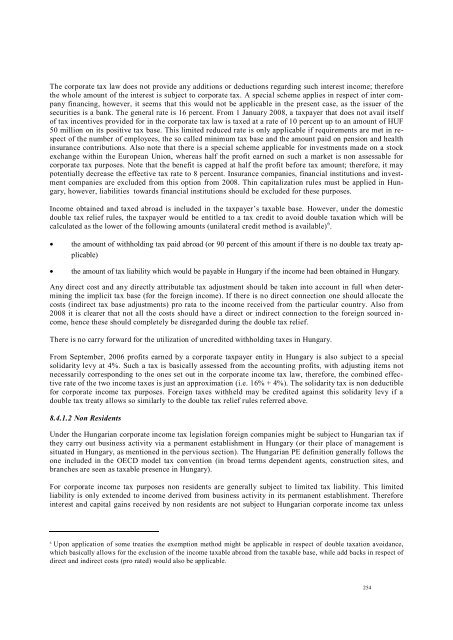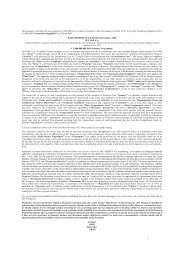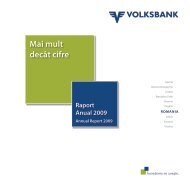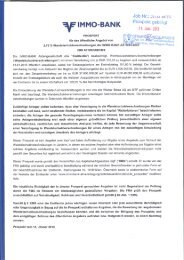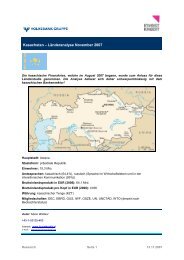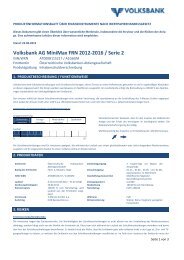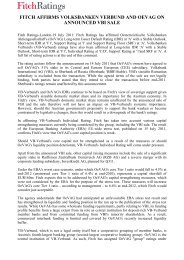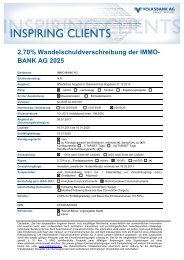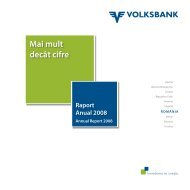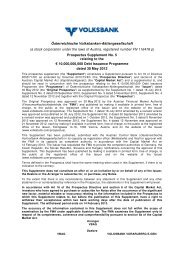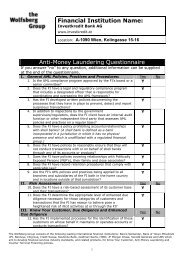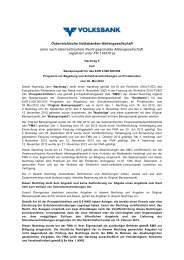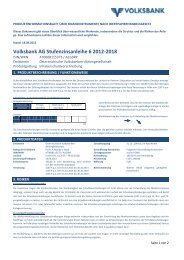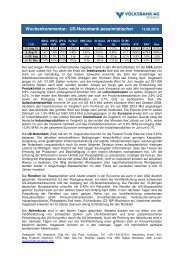EUR 3000000000 debt issuance programme, 10 ... - Volksbank AG
EUR 3000000000 debt issuance programme, 10 ... - Volksbank AG
EUR 3000000000 debt issuance programme, 10 ... - Volksbank AG
You also want an ePaper? Increase the reach of your titles
YUMPU automatically turns print PDFs into web optimized ePapers that Google loves.
The corporate tax law does not provide any additions or deductions regarding such interest income; therefore<br />
the whole amount of the interest is subject to corporate tax. A special scheme applies in respect of inter company<br />
financing, however, it seems that this would not be applicable in the present case, as the issuer of the<br />
securities is a bank. The general rate is 16 percent. From 1 January 2008, a taxpayer that does not avail itself<br />
of tax incentives provided for in the corporate tax law is taxed at a rate of <strong>10</strong> percent up to an amount of HUF<br />
50 million on its positive tax base. This limited reduced rate is only applicable if requirements are met in respect<br />
of the number of employees, the so called minimum tax base and the amount paid on pension and health<br />
insurance contributions. Also note that there is a special scheme applicable for investments made on a stock<br />
exchange within the European Union, whereas half the profit earned on such a market is non assessable for<br />
corporate tax purposes. Note that the benefit is capped at half the profit before tax amount; therefore, it may<br />
potentially decrease the effective tax rate to 8 percent. Insurance companies, financial institutions and investment<br />
companies are excluded from this option from 2008. Thin capitalization rules must be applied in Hungary,<br />
however, liabilities towards financial institutions should be excluded for these purposes.<br />
Income obtained and taxed abroad is included in the taxpayer’s taxable base. However, under the domestic<br />
double tax relief rules, the taxpayer would be entitled to a tax credit to avoid double taxation which will be<br />
calculated as the lower of the following amounts (unilateral credit method is available) 6 .<br />
• the amount of withholding tax paid abroad (or 90 percent of this amount if there is no double tax treaty applicable)<br />
• the amount of tax liability which would be payable in Hungary if the income had been obtained in Hungary.<br />
Any direct cost and any directly attributable tax adjustment should be taken into account in full when determining<br />
the implicit tax base (for the foreign income). If there is no direct connection one should allocate the<br />
costs (indirect tax base adjustments) pro rata to the income received from the particular country. Also from<br />
2008 it is clearer that not all the costs should have a direct or indirect connection to the foreign sourced income,<br />
hence these should completely be disregarded during the double tax relief.<br />
There is no carry forward for the utilization of uncredited withholding taxes in Hungary.<br />
From September, 2006 profits earned by a corporate taxpayer entity in Hungary is also subject to a special<br />
solidarity levy at 4%. Such a tax is basically assessed from the accounting profits, with adjusting items not<br />
necessarily corresponding to the ones set out in the corporate income tax law, therefore, the combined effective<br />
rate of the two income taxes is just an approximation (i.e. 16% + 4%). The solidarity tax is non deductible<br />
for corporate income tax purposes. Foreign taxes withheld may be credited against this solidarity levy if a<br />
double tax treaty allows so similarly to the double tax relief rules referred above.<br />
8.4.1.2 Non Residents<br />
Under the Hungarian corporate income tax legislation foreign companies might be subject to Hungarian tax if<br />
they carry out business activity via a permanent establishment in Hungary (or their place of management is<br />
situated in Hungary, as mentioned in the pervious section). The Hungarian PE definition generally follows the<br />
one included in the OECD model tax convention (in broad terms dependent agents, construction sites, and<br />
branches are seen as taxable presence in Hungary).<br />
For corporate income tax purposes non residents are generally subject to limited tax liability. This limited<br />
liability is only extended to income derived from business activity in its permanent establishment. Therefore<br />
interest and capital gains received by non residents are not subject to Hungarian corporate income tax unless<br />
6 Upon application of some treaties the exemption method might be applicable in respect of double taxation avoidance,<br />
which basically allows for the exclusion of the income taxable abroad from the taxable base, while add backs in respect of<br />
direct and indirect costs (pro rated) would also be applicable.<br />
254


